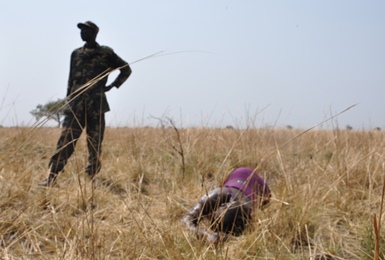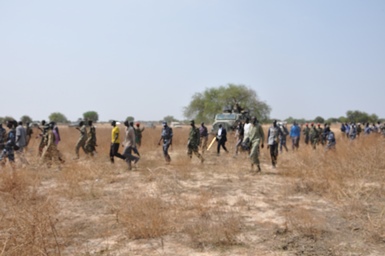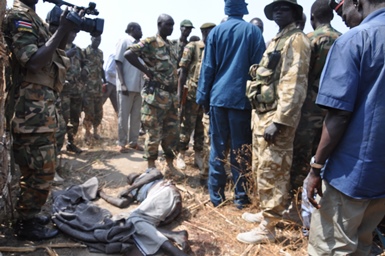SPLA condemns killing of civilians in Jonglei’s Kolnyang
February 7, 2014 (BOR) – The South Sudanese army (SPLA) has condemned the killing of civilians in Jonglei state’s Kolnyang payam (district), calling it a “complete breach” of human rights law.

“This was an organised attack. Look [at] the way they surrounded the village. This is a massacre, it is a complete breach of civilians protection law in the country”, Ayom said.
According to eyewitness accounts, the attackers struck in the early evening after surrounding the village, located about around 30km north-east of the capital, Bor, firing indiscriminately at civilians.
Ayom conceded that village headmen had requested that a protection force be stationed in and around Kolnyang prior to the attack, but there had been delays in deploying the troops in time.
“We (the SPLA) will try our best to do something. The SPLA will continue to protect the civilians and their property in their areas”, he said.
The twenty-eight dead included 19 women and nine men. Eleven children were abducted and three other women remain unaccounted for.
Makech Macthuy Bol and his wife, whose four children abducted during the attacks, were among the dead, as well as well-known traditional healer Akol Bol Angok and his wife.
LOCALS ACCUSE MURLE
Members of the Nuer tribe affiliated with former vice-president-turned rebel leader Riek Machar were initially suspected of involvement.
However, local survivors of the attack on Kolnyang have accused members of the Murle ethnic group of attacking their village.

“First when they came from different directions shooting the people; they were carrying small sticks (for placing the gun-barrels on for aiming at targets) which they used for shooting the targets. This is common with Murle youth in [rebel stronghold] Pibor [county]”, he told a delegation of military and government officials visiting the area, adding that the abduction of children was another common practice among the ethnic group.
“We also followed them and [they] headed to Pibor across the desert”, he added.
Jonglei state has previously been the scene of a long-running insurgency led by rebel leader David Yau Yau, who hails from the Murle tribe, although the group recently signed a peace deal with the central government.
CRIMINAL ACT
Bor county commissioner Agot Alier Leek, who was among the visiting delegation, said he had come to bury the dead and to bear witness to what he called a “massacre” and “criminal act”.
He said the government would hold those responsible for the attack accountable.
“We will establish the facts about where the attackers belong to [and] who organised them to come and attack the people here”, he said.

CIVILIANS FLEE
Sudan Tribune witnessed hundreds of civilians from Kolnyang and Anyidi payams moving towards Bor with their goats, and other household belongings amid fears of a repeat attack, while others fled to Lakes state.
Attempts to reach Murle representatives for comment were unsuccessful.
Bor was the centre of fierce fighting between government troops loyal to Kiir and pro-Machar rebel forces battling for control of the strategic town.
The fighting has taken a devastating toll on the local population, all but destroying the town’s infrastructure and economy.
The collection and burial of the dead in Bor town is continuing almost three weeks after the town was retaken from rebel forces on 18 January.
Some 1,000 people are suspected to have died in the violence, which erupted on 15 December in the capital, Juba, before spreading throughout the country.
(ST)
